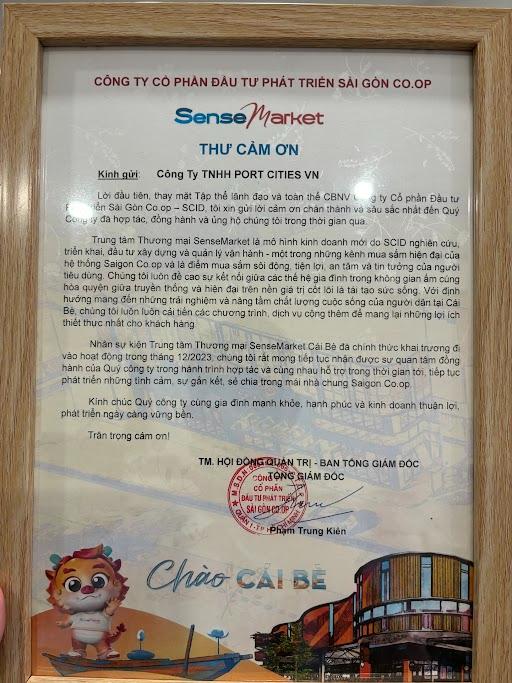
- Name of Organization: Saigon Co.op Investment Development Corporation
- Location: Vietnam
- Industry: Commercial real estate business, management and operation of shopping malls
- Company size: Large
- Number of users: 20
- Time of implementation: 5-8 months
- Systems implemented: Mall, Leasing, Contacts, Accounting, Invoicing
Saigon Co.op Investment Development Corporation (SCID) is a major player in Vietnam's dynamic retail sector. As a key player in commercial real estate, project development, and financial investment, SCID's portfolio includes the sprawling SenseCity and SenseMarket mall chains.
But even giants can stumble, and SCID found itself grappling with a Goliath-sized problem: a fragmented, paper-based operational process that was about as cutting-edge as a stone tablet.
To address these challenges, SCID turned to Portcities and its versatile enterprise software solution, Odoo. Together, they set out to drag SCID's mall management into the digital age, turning a labyrinth of paperwork into a streamlined digital ecosystem.
Business Challenges
Before Odoo, SCID's operations were heavily paper-based. Their leasing processes were inefficient, with slow approvals and frequent errors. Each mall operated independently, lacking standardization.
- Lack of integration and data consistency: Data inconsistencies and lack of integration between different systems and departments led to errors, delays, and inefficiencies in decision-making.
- Inadequate financial management: Manual accounting processes lead SCID to experience delays and inaccuracies in financial reporting. Without the use of Odoo, making knowledgeable financial choices regarding when to adjust rental rates, determining the optimal timing for launching flexible lease term campaigns, or pursuing lease enforcement initiatives becomes more challenging for decision-makers.
- Counterproductive project management: Uncoordinated project management approaches result in delays and surpassing of the budget, creating difficulties for the leasing management industry to complete their projects, including tenant retention initiatives, sustainability projects, and property marketing projects – within the specified timeline and budget.
- Manual management of customer relationships: Inefficient manual processes for managing relationships result in substandard customer service and lower retention rates, making it challenging to effectively develop and maintain strong customer relationship connections over time.
The absence of a unified system created significant challenges for SCID's Accounting and Finance departments. Tracking income across multiple malls was particularly difficult, hindering accurate financial reporting and analysis.
Solution Overview
Portcities provided a leasing management solution for the SenseMarket Cái Bè shopping center. The pilot project went well, thus the company planned to deploy it across all SCID shopping centers nationwide, including:
- A management system that covers all aspects of the leasing process, including handling contracts, processing renewals, managing terminations, obtaining approvals, and utilizing electronic signature and storage capabilities for efficient record-keeping and document management.
- The installation of a Customer Relationship Management (CRM) for tenant management which involves the strategic use of sales and marketing tools. It was designed by Portcities for Saigon Co.op Investment to effectively manage, analyze, and improve their interactions with their tenants throughout the customer lifecycle.
- Odoo modern Accounting app and automation tools to optimize and standardize accounting procedures. It was designed with creating efficient and interconnected financial processes in mind throughout the organization.
- The improvement of CSID’s reporting and analysis system to provide comprehensive analysis capabilities for informed business decision-making. This includes enhancements to financial reports, leasing reports, monthly tracking reports, and movement reports.
The solution was implemented on Odoo 16 with installed applications:
- Mall (custom module by Portcities)
- Leasing (custom module by Portcities)
- Contacts
- Accounting
- Invoicing
However, the key feature that takes the cake is a custom-built API that integrates Odoo with Viettel's S-Invoice system. This integration enables SCID to issue state-compliant electronic invoices efficiently.
Implementation Process
The transition from paper-based systems to a digital framework for SCID took a period ranging from 5 to 8 months. This process involved a series of methodical steps including assessment, system customization, and staff training.
Initially, Portcities conducted an in-depth analysis of SCID's existing processes to devise a comprehensive digital transformation strategy.
Following this, the team focused on configuring the Odoo ERP system, customizing it to meet the specific requirements of SCID. A critical aspect of the project was data migration, which was managed with precision to ensure the secure transfer of all valuable information from the paper-based system to the digital platform.
The effectiveness of the new system was heavily dependent on the user’s ability to operate it efficiently. Thus, extensive training sessions were conducted to enhance the digital capabilities of SCID’s employees, equipping them with the skills necessary to efficiently use Odoo for their operational needs.
Results and Impact

The transformation significantly improved operational efficiency.
SCID transitioned from a paper-based process to a fully digitalized system, substantially reducing the processing time for tasks that previously took days to mere minutes. This digital overhaul also led to a dramatic decrease in errors, making such occurrences extremely rare.
The introduction of a unified system has enabled SCID's Accounting and Finance teams to efficiently manage and track income across various malls. This system provides a comprehensive financial overview, simplifying the management of multi-mall operations.
There has been a significant increase in both efficiency and productivity in SCID's operations, as evidenced by the malls' improved precision and coordination.
Lessons Learned and Best Practices
The transformation undertaken by SCID illustrates a critical insight: in the contemporary digital landscape, dependence on paper-based processes acts as a restraint rather than a support mechanism.
The project achieved its goals largely due to SCID's complete and enthusiastic adoption of digital solutions. This further emphasized the importance of this shift is the strategic integration carried out by SCID.
By effectively linking Odoo, an all-encompassing ERP system, with S-Invoice, a specialized invoicing solution, SCID was able to automate and fluidize the movement from operational activities to compliance adherence.
This case exemplifies the necessity of interoperability and collaboration between different digital platforms in the modern business environment.
Conclusion
SCID's transformation from relying on traditional paper-based methods to fully embracing digital technology represents a remarkable achievement that stands as a model for the evolution of the retail industry.
Through the implementation of Odoo, SCID has not simply adapted to the digital era; they have established themselves as leaders within it.
Navigating the constantly shifting terrain of retail and real estate, SCID has constructed a robust digital infrastructure that not only meets current demands but also anticipates and prepares for future challenges.
This remarkable shift demonstrates that even established retail powerhouses can adapt and thrive by embracing new technologies, particularly when those technologies involve replacing manual processes with efficient digital systems.
So what are you waiting for? Contact our experts to gain insights on how you can replicate the same result for your leasing management business!
